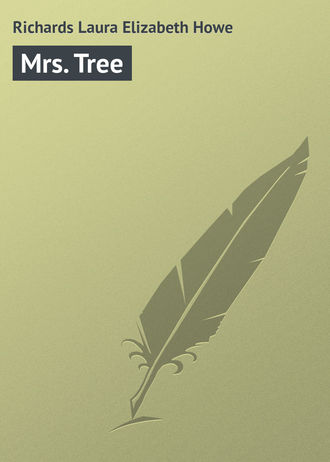
Laura Richards
Mrs. Tree
CHAPTER XI.
MISS PHŒBE PASSES ON
Miss Phœbe Blyth's death came like a bolt from a clear sky. The rheumatism, which had for so many years been her companion, struck suddenly at her heart. A few hours of anguish, and the stout heart had ceased to beat, the stern yet kindly spirit was gone on its way.
Great was the grief in the village. If not beloved as Miss Vesta was, Miss Phœbe was venerated by all, as a woman of austere and exalted piety and of sterling goodness. All Elmerton went to her funeral, on a clear October day not unlike Miss Phœbe herself, bright, yet touched with wholesome frost. All Elmerton went about the rest of the day with hushed voice and sober brow, looking up at the closed shutters of the Temple of Vesta, and wondering how it fared with the gentle priestess, now left alone. The shutters were white and fluted, and being closed, heightened the effect of clean linen which the house always presented – linen starched to the point of perfection, with a dignified frill, but no frivolity of lace or trimming.
"I do declare," said Miss Penny Pardon, telling her sister about it all, "the house looked so like Miss Blyth herself, I expected to hear it say, 'Pray step in and be seated!' just like she used to. Elegant manners Miss Blyth had; and she walked elegant, too, in spite of her rheumatiz. When I see her go past up the street, I always said, 'There goes a lady, let the next be who she will!'"
"Yes," said Miss Prudence, with a sigh; "if Phœbe Blyth had but dressed as she might, there's no one in Elmerton could have stood beside her for style. I've told her so, time and again, but she never would hear a word. She was peculiar."
"There! I expect we're all peculiar, sister, one way or another," said Miss Penny, soothingly. This matter of the Blyth girls' dressing was Miss Prudence's great grievance, and just now it was heightened by circumstances.
"Miss Blyth's mind was above clothes, I expect, Prudence," Miss Penny continued. "'Twa'n't that she hadn't every confidence in you, for I've heard her speak real handsome of your method."
"A person's mind has no call to be above clothes," said Miss Prudence, with some asperity. "They are all that stands between us and savages, some think. But I've no wish to cast reflections this day. Miss Blyth was a fine woman, and she is a great loss to this village. But I do say she was peculiar, and I'll stand to that with my dying breath; and I do think Vesta shows a want of – "
She stopped abruptly. The shop-bell rang, and Mrs. Weight entered, crimson and panting. She hurried across the shop, and entered the sewing-room before Miss Penny could go to meet her.
"Well," she said, "here I am! How do you do, Prudence? You look re'l poorly. Girls, I've come straight to you. I'm not one to pass by on the other side, never was. I like to sift a thing to the bottom, and get the rights of it. I'm not one to spread abroad, but when I do speak, I desire to speak the truth, and for that truth I have come to you."
She paused, and fixed a solemn gaze on the two sisters.
"You'll get it!" said Miss Prudence, a steely glitter coming into her gray eyes. "We ain't in the habit of tellin' lies here, as I know of. What do you want?"
"I want to know if it's true that Vesta Blyth isn't going to wear mourning for her sole and only sister. I want to know if it's so! You could have knocked me down with a broom-straw when I see her settin' there in her gray silk dress, for all the world as if we'd come to sewin'-circle instead of a funeral. I don't know when I have had such a turn; I was palpitating all through the prayer. Now I want you to tell me just how 'tis, girls, for, of course, you know – unless she sent over to Cyrus for her things, and they been delayed. I shouldn't hardly have thought she'd have done that, though some say that new dressmaker over there has all the styles straight from New York. What say?"
"I don't know as I've said anything yet," said Miss Prudence, with ominous calm. "I don't know as I've had a chance. But it's true that Miss Vesta Blyth don't intend to put on mourning."
"Well, I – "
For once, words seemed to fail Mrs. Weight, and she gaped upon her hearers open-mouthed; but speech returned quickly.
"Girls, I would not have believed it, not unless I had seen it with these eyes. Even so, I supposed most likely there had been some delay. I asked Mis' Tree as we were comin' out – she spoke pleasant to me for once in her life, and I knew she must be thinkin' of her own end, and I wanted to say something, so I says, 'Vesta ain't got her mournin' yet, has she, Mis' Tree?'
"She looked at me jest her own way, her eyes kind o' sharpenin' up, and says, 'Neither has the Emperor of Morocco! Isn't it a calamity?'
"I dono what she meant, unless 'twas to give me an idee what high connections they had, though it ain't likely there's anything of that sort; I never heerd of any furrin blood in either family: but I see 'twas no use tryin' to get anything out of her, so I come straight to you. And here you tell me – what does it mean, Prudence Pardon? Are we in a Christian country, I want to know, or are we not?"
Miss Prudence knit her brows behind her spectacles. "I don't know, sometimes, whether we are in a Christian country or whether we ain't," she said, grimly. "Miss Phœbe Blyth didn't approve of mourning, on religious grounds; and Miss Vesta feels it right to carry out her sister's views. That's all there is to it, I expect; I expect it's their business, too, and not other folks'."
"Miss Phœbe thought mournin' wa'n't a Christian custom," said Miss Penny. "I've heard her say so; and that 'twas payin' too much respect to the perishin' flesh. We don't feel that way, Sister an' me, but them was her views, and she was a consistent, practical Christian, if ever I see one. I don't think it strange, for my part, that Miss Vesta should wish to do as was desired, though very likely her own feelin's may have ben different. She would be a perfect pictur' in a bunnet and veil, though I dono as she could look any prettier than what she did to-day."
"If I could have the dressin' of Vesta Blyth as she should be dressed," said Miss Prudence, solemnly, "there's no one in this village – I'll go further, and say county – that could touch her. She hasn't the style of Phœbe, but – there! there's like a light round her when she moves; I don't know how else to put it. It's like stickin' the scissors into me every time I cut them low shoulders for her. I always did despise a low shoulder, long before I ever thought I should be cuttin' of 'em."
"Well, girls," said Mrs. Weight, "you may make the best of it, and it's handsome in you, I will say, Prudence, for of course you naturally looked to have the cuttin', and I suppose all dressmakers get something extry for mournin', seein' it's a necessity, or is thought so by most Christian people. But I am the wife of the senior deacon of the parish wherein she sits, and I feel a call to speak to Vesta Blyth before I sleep this night. Our pastor's wife is young, and though I am aware she means well, she hasn't the stren'th nor yet the faculty to deal with folks as is older than herself on spiritual matters; so I feel it laid upon me – "
"I thought it was clothes you was talkin' about," said Miss Prudence, and she closed her scissors with a snap. "I hope you'll excuse me, Mis' Weight, but you speakin' to Vesta Blyth about spiritual matters seems to me jest a leetle mite like a hen teachin' a swallow to fly."
While this talk was going on, little Miss Vesta, in her gray gown and white kerchief, was moving softly about the lower rooms of the Temple of Vesta, setting the chairs in their accustomed places, passing a silk cloth across their backs in case of finger-marks, looking anxiously for specks of dust on the shining tables and whatnots, putting fresh flowers in the vases. Some well-meaning but uncomprehending friends had sent so-called "funeral flowers," purple and white; to these Miss Vesta added every glory of yellow, every blaze of lingering scarlet, that the garden afforded. She threw open the shutters, and let the afternoon sun stream into the darkened rooms.
Diploma Crotty, standing in a corner, her hands folded in her apron, her eyes swollen with weeping, watched with growing anxiety the slight figure that seemed to waver as it moved from very fatigue.
"That strong light'll hurt your eyes, Miss Blyth," she said, presently. "You go and lay down, and I'll bring you a cup of tea."
"No, I thank you, Diploma," said Miss Vesta, quietly; and she added, with a soft hurry in her voice, "And if you would please not to call me Miss Blyth, my good Diploma, I should be grateful to you. Say 'Miss Vesta,' as usual, if you please. I desire – let us keep things as they have been – as they have been. My beloved sister has gone away" – the soft even voice quivered, but did not break – "gone away, but not far. I am sure I need not ask you, Diploma, to help me in keeping everything as my dear sister would like best to have it. You know so well about almost every particular; but – she preferred to have the tidies straight, not cornerwise. You will not feel hurt, I am sure, if I alter them. They are beautifully done up, Diploma; it would be a real pleasure to my dear sister to see them."
"I knew they were on wrong," said the handmaid, proceeding to aid in changing the position of the delicate crocheted squares. "Mis' Bliss wanted to do something to help, – she's real good, – and I had them just done up, and thought she couldn't do much harm with 'em. There! I knew Deacon Weight wouldn't rest easy till he got his down under him. He's got it all scrunched up, settin' on it. It doos beat all how that man routs round in his cheer."
"Hush, Diploma! I must ask you not to speak so," said Miss Vesta. "Deacon Weight is an officer of the church. I fear he may have chosen a chair not sufficiently ample for his person. There, that will do nicely! Now I think the room looks quite as my dear sister would wish to see it. Does it not seem so to you, Diploma?"
"The room's all right," said Diploma, gruffly; "but if Miss Blyth was here, she'd tell you to go and lay down this minute, Miss Vesty, and so I bid you do. You're as white and scrunched as that tidy. No wonder, after settin' up these two nights, and all you've ben through. I wish to goodness Doctor Strong had ben here; he'd have made you get a nurse, whether or whethern't. Doctor Stedman ain't got half the say-so to him that Doctor Strong has."
"You are mistaken, Diploma!" said Miss Vesta, blushing. "Doctor Stedman spoke strongly, very strongly indeed. He was very firm on the point; indeed, he became incensed about it, but it was not a point on which I could give way. My dear sister always said that no hireling should ever touch her person, and I consider it one of my crowning mercies that I was able to care for her to the last; with your help, my dear Diploma! I could not have done it without your help. I beg you to believe how truly grateful I am to you for your devotion."
"Well, there ain't no need, goodness knows!" grumbled Diploma Crotty, "but if so you be, you'll go and lay down now, Miss Vesty, like a good girl. There! there's Mis' Weight comin' up the steps this minute of time. I'll go and tell her you're on the bed and can't see her."
Was it Miss Vesta, gentle Miss Vesta, who answered? It might have been Miss Phœbe, with head erect and flashing eyes of displeasure.
"You will tell the simple truth, Diploma, if you please. Tell Mrs. Weight that I do not desire to see her. She should know better than to call at this house to-day on any pretence whatever. My dear sister would have been highly incensed at such a breach of propriety. I – " the fire faded, and the little figure drooped, wavered, rested for a moment on the arm of the faithful servant. "I thank you, my good Diploma. I will go and lie down now, as you thoughtfully suggest."
CHAPTER XII.
THE PEAK IN DARIEN
Then felt I like some watcher of the skies
When a new planet swims into his ken:
Or like stout Cortez, when with eagle eyes
He stared at the Pacific, and all his men
Look'd at each other with a wild surmise —
Silent, upon a peak in Darien.
– John Keats.
Behind the yellow walls of the post-office Mr. Homer Hollopeter mourned deeply and sincerely for his cousin. The little room devoted to collecting and dispensing the United States mail, formerly a dingy and sordid den, had become, through Mr. Homer's efforts, cheerfully seconded by those of Will Jaquith, a little temple of shining neatness, where even Miss Phœbe's or Miss Vesta's dainty feet might have trod without fear of pollution. It was more like home to Mr. Homer than the bare little room where he slept, and now that it was his own, he delighted in dusting, polishing, and cleaning, as a woman might have done. The walls were brightly whitewashed, and adorned with portraits of Keats and Shelley; on brackets in two opposite corners Homer and Shakespeare gazed at each other with mutual approval. The stove was black and glossy as an Ashantee chief, and the clock, once an unsightly mass of fly-specks and cobwebs, now showed a white front as immaculate as Mr. Homer's own. Opposite the clock hung a large photograph, in a handsome gilt frame, of a mountain peak towering alone against a clear sky.
When Mr. Homer entered the post-office the day after Miss Phœbe's funeral, he carried in his hand a fine wreath of ground pine tied with a purple ribbon, and this wreath he proceeded to hang over the mountain picture. Will Jaquith watched him with wondering sympathy. The little gentleman's eyes were red, and his hands trembled.
"Let me help you, sir!" cried Jaquith, springing up. "Let me hang it for you, won't you?"
But Mr. Homer waved him off, gently but decidedly.
"I thank you, William, I thank you!" he said, "but I prefer to perform this action myself. It is – a tribute, sir, to an admirable woman. I wish to pay it in person; in person."
After some effort he succeeded in attaching the wreath, and, standing back, surveyed it with mournful pride.
"I think that looks well," he said. "My fingers are unaccustomed to twine any garlands save those of – a – song; but I think that looks well, William?"
"Very well, sir!" said Will, heartily. "It is a very handsome wreath; and how pretty the green looks against the gold!"
"The green is emblematic; it is the color of memory," said Mr. Homer. "This wreath, though comparatively enduring, will fade, William; will – a – wither; will – a – become dessicated in the natural process of decay; but the memory of my beloved cousin will endure, sir, in one faithful heart, while that heart continues to – beat; to – throb; to – a – palpitate."
He was silent for a few minutes, gazing at the picture; then he continued:
"I had hoped," he said, sadly, "that at some date in the near future my dear cousin would have condescended to visit our – retreat, William, and have favored it with the seal of her approval. I venture to think that she would have found its conditions improved; ameliorated – a – rendered more in accordance with the ideal. But it was not to be, sir, it was not to be. As the lamented Keats observes, 'The Spirit mourn'd "Adieu!"' She is gone, sir; gone!"
"I have often meant to ask you, sir," said Will Jaquith, "what mountain that is. I don't seem to recognize it."
Mr. Homer was silent, his eyes still fixed on the picture. Jaquith, thinking he had not heard, repeated the question.
"I heard you, William, I heard you!" said Mr. Homer, with dignity. "I was considering what reply to make to you. That picture, sir, represents a Peak in Darien."
"Indeed!" said Will, in surprise. "Do you know its name? I did not think there were any so high as this."
Mr. Homer waved his hands with a vague gesture.
"I do not know its name!" he said, "Therefore I expressly said, a peak. I do not even know that this special mountain is in Darien, though I consider it so; I consider it so. The picture, William, is a symbolical one – to me. It represents – a – Woman."
"Woman!" repeated Jaquith, puzzled.
"Woman!" said Mr. Homer. His mild face flushed; he cleared his throat nervously, and opened and shut his mouth several times.
"I pay to-day, as I have told you, my young friend, a tribute to one admirable woman; but the Peak in Darien symbolizes – a – Woman, in general. Without Woman, sir, what, or where, should we be? Until we attain a knowledge of – a – Woman, through the medium of the – a – Passion (I speak of it with reverence!), what, or where are we? We journey over arid plains, we flounder in treacherous quagmires. Suddenly looms before us, clear against the sky, as here represented, the Peak in Darien – Woman! Guided by the – a – Passion (I speak of its lofty phases, sir, its lofty phases!), we scale those crystal heights. It may be in fancy only; it may be that circumstances over which we have no control forbid our ever setting an actual foot on even the bases of the Peak; but this is a case in which fancy is superior to fact. In fancy, we scale those heights; and – and we stare at the Pacific, sir, and look at each other with a wild surmise – silent, sir, silent, upon a Peak in Darien!"
Mr. Homer said no more, but stood gazing at his picture, rapt in contemplation. Jaquith was silent, too, watching him, half in amusement, half – or more than half – in something not unlike reverence. Mr. Homer was not an imposing figure: his back was long, his legs were short, his hair and nose were distinctly absurd; but now, the homely face seemed transfigured, irradiated by an inward glow of feeling.
Jaquith recalled Mrs. Tree's words. Had this quaint little gentleman really been in love with his beautiful mother? Poor Mr. Homer! It was very funny, but it was pathetic, too. Poor Mr. Homer!
The young man's thoughts ran on swiftly. The Peak in Darien! Well, that was all true. Only, how if – unconsciously he spoke aloud, his eyes on the picture – "How if a man were misled for a time by – I shall have to mix my metaphors, Mr. Homer – by a will-o'-the-wisp, and fell into the quagmire, and lost sight of his mountain for a time, only to find it again, more lovely than – would he have any right to – what was it you said, sir? – to try once more to scale those crystal heights?"
"Undoubtedly he would!" said Mr. Homer Hollopeter. "Undoubtedly, if he were sure of himself, sure that no false light – I perceive the mixture of metaphors, but this cannot always be avoided – would again fall across his path."
"He is sure of that!" said Will Jaquith, under his breath.
He had risen, and the two men were standing side by side, both intent upon the picture. Twilight was falling, but a ray of the setting sun stole through the little window, and rested upon the Peak in Darien.
"He is sure of that!" repeated William Jaquith.
When he spoke again, his voice was husky, his speech rapid and broken.
"Mr. Homer" (no one ever said "Mr. Hollopeter," nor would he have been pleased if any one had), "I have been here six months, have I not? six months to-morrow?"
"Yes, William," said Mr. Homer, turning his mild eyes on his assistant.
"Have I – have I given satisfaction, sir?"
"Eminent satisfaction!" said Mr. Homer, cordially. "William, I have had no fault to find; none. Your punctuality, your exactness, your assiduity, leave nothing to be desired. This has been a great gratification to me – on many accounts."
"Then, you – you think I have the right to call myself a man once more; that I have the right to take up a man's life, its joys, as well as its labors?"
"I think so, most emphatically," cried the little gentleman, nodding his head. "I think you deserve the best that life has to give."
"Then – then, Mr. Homer, may I have a day off to-morrow, please? I want" – he broke into a tremulous laugh, and laid his hand on the elder man's shoulder, – "I want to climb the Peak, Mr. Homer!"
So it came to pass one day, soon after this, that as Mrs. Tree was sitting by her fire, with the parrot dozing on his perch beside her, there came to the house two young people, who entered without knock or ring, and coming hand in hand to her side, bent down, not saying a word, and kissed her.
"Highty tighty!" cried Mrs. Tree, her eyes twinkling very brightly under a tremendous frown.
"What is the meaning of all this, I should like to know? How dare you kiss me, Willy Jaquith?"
"Old friends to love!" said Jocko, opening one yellow eye, and ruffling his feathers knowingly.
"Jocko knows how I dare!" said Will Jaquith. "Dear old friend, I will tell you what it means. It means that I have brought you another Golden Lily in place of the one you said I spoiled. You can only have her to look at, though, for she is mine, mine and my mother's, and we cannot give her up, even to you."
"I didn't exactly break my promise, Lily!" cried the old lady; her hands trembled on her stick, but her cap was erect, immovable. "I didn't tell him, but I never promised not to tell James Stedman, you know I never did."
The lovely, dark-eyed girl bent over her and kissed the withered cheek again.
"My dear! my naughty, wicked, delightful dear," she murmured, "how shall I ever forgive you – or thank you?"







